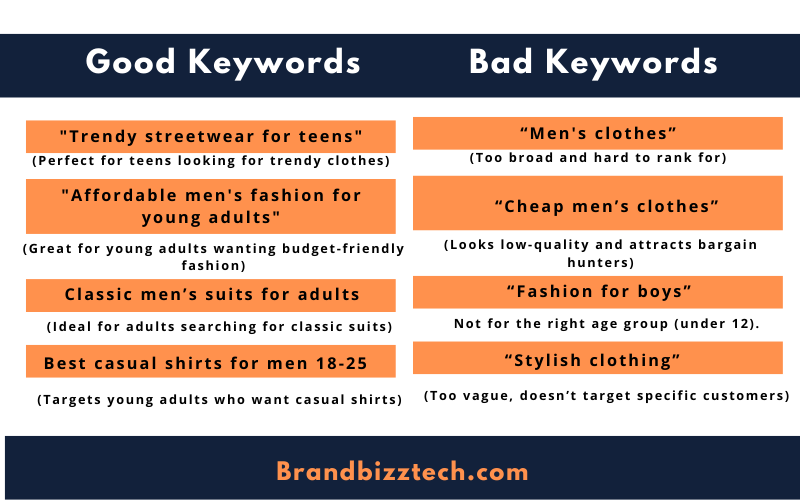In today’s competitive online landscape, keywords in SEO are essential for improving your website’s visibility and driving targeted traffic. Keywords are the specific words and phrases users enter into search engines when looking for products, services, or information. Incorporating relevant keywords while doing SEO of your content helps search engines understand what your site is about, leading to higher rankings and more visitors.
Table of Contents
ToggleTypes of Keywords:
- Short Tail SEO Keywords
- Long Tail SEO Keywords
- Local SEO Keywords
- Transactional SEO Keywords
- Informational SEO Keywords
Short-Tail SEO Keywords
These broad, high-volume SEO keywords, such as “men’s clothing,” attract large traffic but are highly competitive. Optimizing short-tail SEO keywords helps build general awareness, though conversions might be lower due to the broad audience.
Long-Tail SEO Keywords
More specific and detailed SEO phrases like “trendy streetwear for teens” capture niche audiences. Though they generate less traffic, these keywords are easier to rank for and often lead to better conversion rates.
Local SEO Keywords
Keywords that include geographic details, such as “men’s clothing store in Jalandhar,” are vital for improving your visibility in local searches. Optimizing your website with local SEO keywords helps attract traffic from specific regions.
Transactional SEO Keywords
These SEO keywords, such as “buy men’s suits online,” indicate high purchase intent. Optimizing for transactional SEO keywords is essential for driving conversions as they target users ready to make a purchase.
Informational SEO Keywords
Phrases like “how to choose the right suit” focus on searchers looking for information. While they may not convert immediately, informational SEO keywords help build trust and guide potential customers toward a purchase.
Choosing the Right Keyword is essential to reach your target audience effectively. This blog will compare good and bad keywords for an online men’s clothing store catering to teenagers, young adults, and older adults.
Now Let’s take an Example of a Men’s Online Clothing Brand to make you understand the difference between Good Keywords and Bad Keywords.
Example Business: “Men’s Online Clothing Brand”
Target Audience:
Teenagers (15-17 years old)
- Young Adults (18-30 years old)
- Adults (30-70 years old)
Good vs. Bad SEO Keywords for an Online Men’s Clothing Brand
In the world of SEO, choosing the right keywords can determine the success or failure of your strategy. For a men’s online clothing store targeting different age groups, understanding what constitutes a “good” or “bad” keyword is essential. By leveraging smart SEO keyword choices, you can significantly boost your site’s visibility and drive targeted traffic that leads to conversions.
Good SEO Keywords:
- Trendy streetwear for teens
- Affordable men’s fashion for young adults
- Classic men’s suits for adults
- Best casual shirts for men 18-25
- “Comfortable men’s clothing for seniors”
1. "Trendy streetwear for teens"
Why it’s a good SEO keyword: This long-tail SEO keyword is highly specific to teenage fashion, ensuring that your content targets younger audiences with relevant trends. Search engines can clearly understand the intent behind this phrase, leading to higher rankings and better alignment with search queries.
2."Affordable men's fashion for young adults"
Why it’s a good SEO keyword: This keyword combines affordability with a demographic (young adults), making it an ideal long-tail SEO keyword. It captures a specific market—young adults seeking budget-friendly options—thus improving your chances of converting traffic into sales.
3."Classic men’s suits for adults"
Why it’s a good SEO keyword: This focuses on older adults looking for timeless clothing options. By using a specific long-tail SEO keyword like this, your store is more likely to rank for high-value searches from users looking for premium, classic suits.
4. "Best casual shirts for men 18-25"
Why it’s a good SEO keyword: This keyword addresses the needs of a particular age group while specifying a product (casual shirts). Long-tail SEO keywords like this provide precision, reduce competition, and attract traffic with a high likelihood of conversion.
5. "Comfortable men's clothing for seniors"
Why it’s a good SEO keyword: Focusing on comfort, a top priority for older adults, this SEO keyword allows search engines to connect your products with user intent, increasing the chances of attracting traffic specifically interested in comfortable men’s fashion.
Bad SEO Keywords:
- “Men’s clothes”
- “Cheap men’s clothes”
- “Fashion for boys”
- “Stylish clothing”
- “Business attire for men”
1. "Men's clothes"
Why it’s a bad SEO keyword: This short-tail SEO keyword is too broad and lacks specificity. The high competition for such a general term makes it difficult to rank, and it attracts a wide range of users who may not be interested in what you offer.
2. Cheap men’s clothes"
Why it’s a bad SEO keyword: Although affordability is important, the term “cheap” can lower the perceived value of your brand. This transactional SEO keyword might attract bargain hunters rather than the quality-focused customers you want to target.
3. "Fashion for boys"
Why it’s a bad SEO keyword: This keyword targets a much younger demographic (under 12), which is not aligned with your target audience of teenagers and adults. Misaligned SEO keywords like this can dilute your search traffic and hurt conversions.
4. "Stylish clothing"
Why it’s a bad SEO keyword: This keyword is overly vague and highly competitive. Without specifying the target demographic, this short-tail SEO keyword competes with a wide range of brands, making it ineffective for driving targeted traffic.
5."Business attire for men"
Why it’s a bad SEO keyword: While relevant to formal clothing, this keyword doesn’t align with the casual or trendy preferences of your primary audience (teenagers and young adults). A poor match between keyword and audience results in lower relevance scores and diminished ranking potential.

Why Good SEO Keywords Work Best
Good SEO keywords work because they are:
- Specific: Narrowing down age groups, product types, and needs makes it easier for search engines to understand your content.
- Relevant: They match the search intent of your audience, increasing the chances of conversions.
- Targeted: By focusing on long-tail SEO keywords, you minimize competition and maximize relevance for your target demographic.
For example, “Trendy streetwear for teens” is a precise, long-tail SEO keyword that clearly matches the fashion interests of younger shoppers, making it more likely to convert.
Why Bad SEO Keywords Fail
Bad SEO keywords tend to fail because they are:
- Too broad: General terms like “men’s clothes” don’t provide enough context for search engines to rank your page effectively.
- Misaligned: Keywords like “fashion for boys” are irrelevant to your target audience, wasting potential traffic.
- Vague: Terms like “stylish clothing” are too competitive and lack focus, making it difficult to rank for meaningful searches.
For instance, “Men’s clothes” is so broad that it fails to capture a specific audience, making it difficult for your site to rank against major competitors.
Conclusion: Choosing the Right SEO Keywords
Good SEO keyword choices are essential for targeting the right audience, improving search engine rankings, and driving conversions. By focusing on precise, long-tail keywords, you can ensure your content reaches users who are most likely to be interested in your products. On the other hand, broad or irrelevant keywords will lead to wasted efforts and poor SEO performance.

